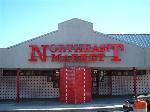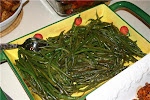Food and Health
Happy Nutrition Month! That's right, the American Dietetic Association has declared March "National Nutrition Month" and to celebrate This Week in Food News is rolling out a special edition that looks at apples, fats, milk, subsidies, and strawberries. http://www2.tricities.com/blogs/eat-smarter-tri-cities/2011/mar/04/week-food-news-happy-nutrition-month-ar-883786/
Vitamin D may be associated with a lower risk of developing stress fractures in preadolescent and adolescent girls, especially among those very active in high-impact activities, according to a report published Online First by Archives of Pediatrics & Adolescent Medicine, one of the JAMA/Archives journals. http://www.sciencedaily.com/releases/2012/03/120305173453.htm
For the first time consumers will get more information to help them decide if cutting down on meat is right for them. As of March 1st, the U.S. Department of Agriculture is requiring that nutrition information be posted on 40 of the most popular cuts of raw meat including chicken breasts, ground beef, pork chops and steak. Nutrition labels will offer a wide variety of information like calories, serving size, cholesterol and saturated fat content. In addition, meat labels will be required to show both the lean content and fat percentage (a cut marked “90% lean”, for example, will now also say “10% fat”). http://www.meatlessmonday.com/usda-to-require-nutrition-labels-on-meat/
Food Safety
Our process of framing and regulating produce food safety is upside down and backwards. Human pathogens constantly flow from urban environments and animal production into farm environments, contaminating water and soil, and finding a home in wildlife. Then we ask farmers to deliver pathogen-free fruits and vegetables. http://www.foodsafetynews.com/2012/03/produce-farming-on-the-brink/
"Pink slime" has been oozing back into headlines in recent weeks after McDonalds, followed by other fast food chains, announced it had stopped using beef trimmings to fill out its hamburgers. A product the industry calls "lean, finely textured meat" has been a fixture in the ground beef served in the free school lunch program and fast food hamburgers for years. But after Chef Jamie Oliver demonstrated how "pink slime" is made on his TV show last year, and media reports suggested it may not be as safe as the government claims, alarm among consumers began surging. http://www.npr.org/blogs/thesalt/2012/03/09/148298678/is-it-safe-to-eat-pink-slime
Although it maintains that the bisphenol A (BPA) in its cans is safe, the Campbell Soup Company says it has already switched to alternatives in some packaging as it ends the use of the controversial chemical. The decision was hailed by the Breast Cancer Fund (BCF) as a victory for consumers. But the group called on Campbell's to disclose its timeline for the phase-out and reveal the alternatives it will use. http://www.foodsafetynews.com/2012/03/campbell-soup-will-phase-out-bpa-use/
Food Assistance
Food stamps are saving many of the nation's poorest children. The food stamp program -- now officially called Supplemental Nutrition Assistance Program or SNAP --reduced the number of extremely poor children by nearly 50 percent in 2011, according to a recently released study by the National Poverty Center. http://www.huffingtonpost.com/2012/03/09/food-stamps-poor-children_n_1335298.html?ref=business
As rising costs and a tough economy squeeze the family pocketbook, school meal programs have witnessed an increase in the number of children who arrive in the school cafeteria without their lunch money. Currently, there is no federal policy for how schools respond to requests for “unpaid meals,” nor is there policy on managing those expenses when incurred. http://www.schoolnutrition.org/Blog.aspx?id=16875&blogid=564
Students and staff at Prince George's County Public Schools are celebrating National School Breakfast Week March 5 to 9 in partnership with Kellogg's cereal company, to increase nutrition awareness and help a local Feeding America food bank. For each school breakfast purchased by students during the week, Kellogg's will donate a bowl of cereal to a local food bank through its "Eat, Share, Prosper" program. http://articles.baltimoresun.com/2012-03-08/explore/ph-ll-edbriefs-breakfast-20120308_1_local-food-bank-kellogg-middle-schools
Breakfast has increasingly become a focus for school nutritionists, both as a means to provide one more meal to low-income students whose families may not have adequate food in the house and to ensure that all students, regardless of family income, don’t start the day hungry. Gov. John Hickenlooper of Colorado and Denver wide receiver Eric Decker – accompanied by some Denver Broncos cheerleaders and DPS Chief Operating Officer David Suppes delivered breakfast to students rolling breakfast carts, to kick off this week’s National School Breakfast Week and Fuel Up to Play 60, a National Dairy Council program that stresses healthy eating and physical activity for students. http://www.ednewscolorado.org/2012/03/04/34134-breakfast-more-common-in-colorado-classrooms
Subscribe to:
Post Comments (Atom)

























































































No comments:
Post a Comment